Where is 'Trad Inc.' in the face of the most 'hyperpapalist' statement ever made?
Leo XIV's words repeatedly presume that he has the power to change Catholic doctrine. But does anybody care?
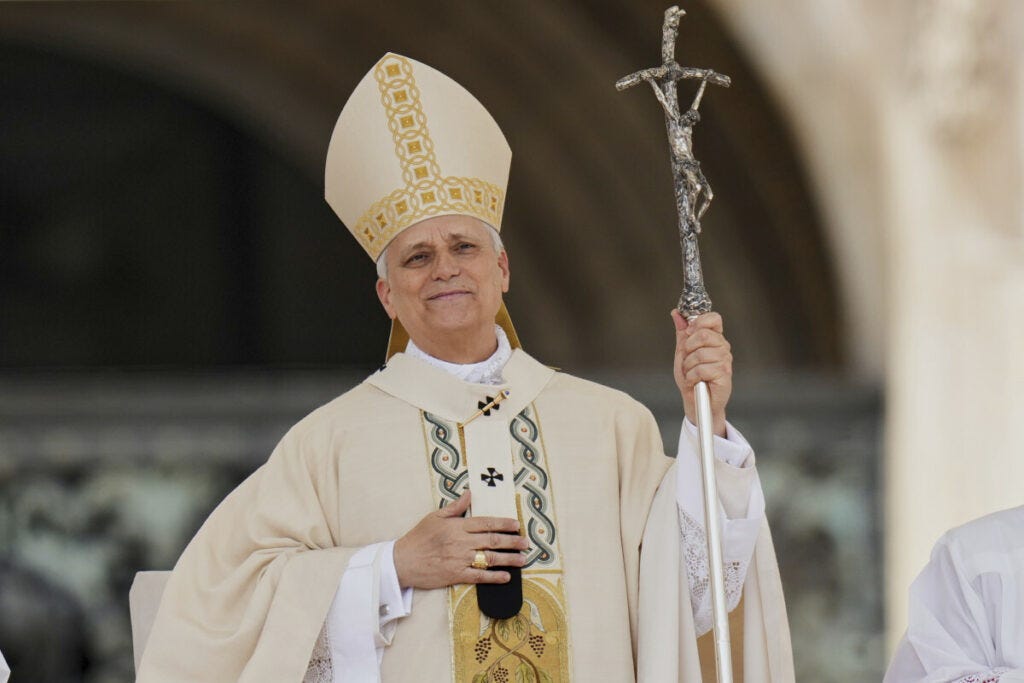
Leo XIV's words repeatedly presume that he has the power to change Catholic doctrine. But does anybody care?
(WM Round-Up) – By now, everyone will have seen clips from Leo XIV's extended interview with Elise Ann Allen of Crux Now.
While some are praising this interview with what used to be called “gay abandon,” this interview reveals that Leo has transcended even Francis in the gravity of his denial of the Catholic religion.
The Immutability of Doctrine
LifeSiteNews published an article explaining that Leo’s comments clearly represent an openness to changing immutable Catholic doctrine on sexual morality and the ordination of women. The now-vindicated CEO John-Henry Westen also published a video based on the same issues.
Leo’s comments clearly represent an openness to changing immutable Catholic doctrine on sexual morality and the ordination of women.
Here are the offending remarks from Leo:
“People want the Church doctrine to change, want attitudes to change. I think we have to change attitudes before we ever change doctrine.
“I find it highly unlikely, certainly in the immediate future, that the Church’s doctrine in terms of what the Church teaches about sexuality, what the Church teaches about marriage [will change].”
He continued:
“I think that the Church’s teaching will continue as it is, and that’s what I have to say about that for right now.”
At another point, discussing the question of female deacons, Prevost said:
“I, at the moment, don’t have an intention of changing the teaching of the Church on the topic.”
Now, we fully recognise that these same words could, with a certain tone of voice and delivery, unambiguously signify the opposite of their plain meaning: in other words, “I, at the moment, don’t have an intention of changing the teaching of the Church” could, under certain circumstances, convey the meaning: “It’s never going to change, so you had get used to it.”
But given the video footage, there is no indication that any of these words were intended in anything other than their plain meaning.
Some have quite desperately suggested that the “change of attitude” mentioned refers to the conversion of those living in public sin – but this is simply risible in both the particular case and the wider context.
Some of Leo’s defenders have been unable to see the gravity of what he has said, and claimed that our interpretations of his words are incorrect and unwarranted. This gravity might be clearer if they imagine him using the same verbal constructions in relation to some other action, such as committing violent assault:
“People want [me to punch you], want attitudes to change. I think we have to change attitudes before we ever [punch you].
“I find it highly unlikely, certainly in the immediate future, that [I am going to punch you].”
“I think that [I am not going to punch you], and that’s what I have to say about that for right now.”
“I, at the moment, don’t have an intention of [punching you].”
If a person said such things to us, we all know that it would be wise to get away from him as quickly as possible. This is because the verbal constructions employed logically entail the possibility of violent assault at some point in the future – even if it does not actually happen (or at least, not until “attitudes change”).
The same applies to what he says about changing doctrine. And this failure to rule out changing doctrine, and this positing of conditions under which such changes could happen, is the problem which his defenders will not acknowledge.
Prevost’s also comments confirm the critical interpretation raised against various moves taken under Francis – including Amoris Laetitia, Fiducia Supplicans, and so on – as well as the audiences granted to Fr James Martin and Sr Lucia Caram, and the LGBT pilgrimage that recently took place in Rome.
Each such move has enjoyed a level of “plausible deniability,” such that the defenders of the Vatican regime had something to work with, and could claim that critics were overreacting.
In fact, Leo has made it undeniable that these moves were intended to “change attitudes” – to pave the way for doctrinal change. Fr James Martin SJ has confirmed that this is also his interpretation of Prevost’s words, and called for his followers to work for these changes.
Pope St Pius X and the modernist conception of the magisterium
We should also note that Prevost’s comments about “changing attitudes” before changing doctrine recall Pope St Pius X’s explanation of the modernist conception of the magisterium in Pascendi Dominici Gregis. This false conception sees the magisterium as existing in order to ratify and to give shape to the religious sentiments of the community:
"No religious society, they say, can be a real unit unless the religious conscience of its members be one, and also the formula which they adopt. But this double unity requires a kind of common mind whose office is to find and determine the formula that corresponds best with the common conscience; and it must have, moreover, an authority sufficient to enable it to impose on the community the formula which has been decided upon.
“From the combination and, as it were, fusion of these two elements, the common mind which draws up the formula and the authority which imposes it, arises, according to the Modernists, the notion of the ecclesiastical magisterium.
“And, as this magisterium springs, in its last analysis, from the individual consciences and possesses its mandate of public utility for their benefit, it necessarily follows that the ecclesiastical magisterium must be dependent upon them, and should therefore be made to bow to the popular ideals.” (n. 25)
Pascendi Dominici Gregis used to be a foundational document for “traditionalists.” Given that Leo has been consistently expressing ideas which it condemned, sometimes even in the terms which Pope St Pius X used (see below), it would seem advisable for the “traditionalist influencers” to re-read this encyclical.
Some reactions to the interview
After presenting the Church’s teaching on the immutability of dogma, the theological notes of the matters undermined by Prevost, and the definition of heresy, Westen raised the question of heresy:
“‘Heretical’ is a big word. But the truth is clear: homosexual acts are intrinsically disordered, marriage is between one man and one woman, and these teachings cannot change.
“As I said above, both the Church’s teaching on sexual morality, and the immutability of dogma are the sorts of truths we have to believe with divine and Catholic faith.
“The censure attached to the obstinate denial or doubt of such truths is indeed heresy. (Can. 751 of 1983 CIC, Can. 1325 of 1917 CIC)”
Those who do not see the justice of raising this topic should consult Jones’ article.
Further, Leo’s comments claim a power utterly beyond that which resides in the Church. Vatican I taught that the Holy Ghost was promised to Peter’s successors:
“… not so that they might, by his revelation, make known some new doctrine, but that, by his assistance, they might religiously guard and faithfully expound the revelation or deposit of faith transmitted by the apostles.”
One would have thought that those who spend their time decrying “hyperpapalism” and “the spirit of Vatican I” would be up in arms about this – but they are not. We will turn to them shortly.
We note that José Antonio Ureta, a researcher for Tradition, Family and Property (TFP), offered some stern comments along the right lines for Edward Pentin at the National Catholic Register:
“The point is not whether such a change is likely or unlikely: the Church’s teaching in these areas cannot change at all,” Ureta told the Register. “The Pope should affirm this with absolute clarity, leaving no room for doubt or ambiguity.”
In spite of this, Ureta claimed to be “somewhat surprised” and “perplexed” by Leo’s comments. But at this stage, it is difficult to see what could be surprising or perplexing.
If anything might be “surprising,” it was seeing TFP’s “filial appeal” referring to Leo’s comments as “auspicious statements in defense of the family”. While Leo did indeed make statements along these lines, this is hardly an appropriate description of an interview that undermines the immutability of Catholic doctrine on these very issues.
Leo’s commitment to continuity with Francis
The TFP “filial appeal” called for Leo to address some of the doctrinal problems of Francis’ pontificate. This is ironic, given that a key theme of the interview was continuity. On every major issue – synodality, women's roles, ecumenism, curial reform, liturgical questions – Prevost positioned himself in continuity with Francis, and his heir.
Even when addressing “LGBTQ questions,” he immediately aligns himself with Francis's approach of “todos, todos, todos.”
All this confirms our previous analysis of Leo’s words a few days after his election, which were as follows:
“I would like us to renew together today our complete commitment to the path that the universal Church has now followed for decades in the wake of the Second Vatican Council.”
You can read about the implications of this continuity here:
Stephen Kokx was widely decried for referring to Prevost as “Francis 2.0” – and while those with their eyes open could see the reality, Prevost has now confirmed this for us himself.
Where are the ‘anti-hyperpapalists,’ and Trad Inc.?
The response to Leo XIV's interview reveals the bankruptcy of much contemporary "traditional" commentary – now routinely referred to as “Trad Inc.”
Leo XIV has claimed the authority to change Church teaching while merely declining to exercise that power “for now.” The integrity of Catholic doctrine has become, in his presentation, a contingent matter depending on the will of the (alleged) Pope.
Where are those who regularly condemn “hyperpapalism” in the face of the most hyperpapal statement ever made by a claimant to the papacy?
They are, in fact, praising aspects of the interview, and condemning those who refuse to look the other way.
It is with great regret that we see some desperately presenting his comments as “measured” and “careful,” and accusing others of engaging in “overreactions.”
But this misses the point entirely. Leo’s language consistently entailed possibility where none exists. On women's ordination, he has "no current intention of changing the teaching.” But saying "I'm not going to change Church teaching any time soon" logically entails that he could do so if he wished.
Others are poring over his remarks about the Latin Mass. In his weekly round-up, Dr Peter Kwasniewski limited his comments on the interview to cautious optimism about the traditional Latin Mass, and did not mention the fundamental doctrinal issues raised:
Others focused on this issue discussed how to “give him the best possible impression” in Rome – whilst ignoring the most extravagant claims to papal power over doctrine itself.
To ignore the more fundamental doctrinal problems in this interview and Leo’s pontificate, in the stated hope of securing more freedom for the traditional Roman rite, is “Latin Mass-ism” at its most myopic.
For more on this “Latin Mass-ism,” and the problems it causes – amply confirmed by this current controversy – see the video by “St AnthonyPadua RadTrad” below:
Silence is complicity
Our colleague Matthew McCusker recently wrote the following:
We do not believe that any sinister human organisation connects all these commentators, but we do think that the term “Trad Inc.” captures a real phenomenon.
“Trad Inc.” is a broad range of commentators who, by choice or through lack of knowledge, limit themselves to expressing opinions that fall within the acceptable bounds of mainstream traditionalist discourse, and restrict themselves to a narrow framework of arguments and reference points that have hardly changed since the 1980s.
Against the approach of these commentators, Pope Felix III established the principle that:
“[A]n error which is not resisted is approved; a truth which is not defended is suppressed […] He who does not oppose an evident crime is open to the suspicion of secret complicity.”1
The attempt to minimise or explain away Leo XIV's statements represents the same mentality that has accommodated each progressive step in the Church's decline since Vatican II. Each compromise prepares the ground for the next, each excuse enables further erosion.
Those who make excuses, who parse words looking for orthodox interpretations that are not there, who focus on other issues while the foundation of religion are denied, mark themselves as one of the following:
Modernists themselves, whether consciously or unconsciously
Failing to grasp the fundamental issues at stake – e.g., believing that caution about whether or not immutable dogma can change is anything other than heresy
In search of co-existence with modernists, and thus content to live on liturgical scraps, in a quasi-Anglican broad-church existence with and under the said modernists.
Whichever class a such persons fall into, they are complicit in the catastrophe, and demonstrate that they have nothing to add to serious discussions of the current catastrophe in the Church.
We should also note that, in a video titled “Trad Roundtable: How Do We Deal with Vatican II,” published less than a fortnight before this interview was released, Dr Peter Kwasniewski directly referred to an Anglican-style approach to the liturgy as being the superior solution to Vatican II:
“If we had a pope, who celebrated the traditional Latin mass in St. Peter’s, that would mean more than than a syllabus of errors about Vatican II. If we had a future pope who reinstated the traditional mass – even as a rite alongside the new rite, the way the Anglicans have different rites – something like that is going to be much more efficacious in overcoming the false ideas and the false mentality that this council ushered in or allowed to to flourish.”2
It is notable that this statement went unchallenged: only Dr Anthony Stine showed signs of displeasure, and the others simply nodding – including a young man who presented himself as aligned with the Society of St Pius X.
This is the state of the discourse, and the endpoint of Latin Mass-ism: the adoption of an Anglicanised ecclesiology, with no sense of how contrary this runs to Catholic ecclesiology, or what a departure it represents from the historical traditionalist response to Vatican II.
Conclusion: ‘Immanent Apostasy’
Apostasy is typically defined as the complete turning away from the faith, while heresy is defined as the denial of individual truths while retaining the Christian name.
In 1965, Jacques Maritain coined the term apostasie immanente (“immanent apostasy”) to describe what he saw as a “novel” form of apostasy – in which the substance of the Christian faith is rejected, yet the name and appearance of Christianity are deliberately retained. In this sense, it is a kind of self-contradictory falling away: not open renunciation, but the internal abandonment of divine and Catholic faith under the guise of fidelity.
Maritain's concept, which has been used in the Cahiers de Cassiciacum and by Abbé Hervé Belmont, may appear to be contradictory or to conflate two separate sins, it does convey something of the reality of our day: apostasy is masked as heresy; which is in turn masked as orthodoxy, through the preservation of outward forms – while the content they once signified is dissolved.3
Whatever the phenomenon is to be called, this is what we are seeing, both in the world and in Leo XIV.
One can wear white, say Catholic-sounding things and even permit the Latin Mass – but if one suffers a shipwreck of the faith, does not believe that the Catholic religion was revealed by God, then none of that will do any good at all.
And neither will attending the holy Roman liturgy – precious though that is.
“Without faith it is impossible to please God.”
HELP KEEP THE WM REVIEW ONLINE WITH WM+!
As we expand The WM Review we would like to keep providing free articles for everyone.
Our work takes a lot of time and effort to produce. If you have benefitted from it please do consider supporting us financially.
A subscription gets you access to our exclusive WM+ material, and helps ensure that we can keep writing and sharing free material for all.
You can see what readers are saying over at our Testimonials page.
(We make our WM+ material freely available to clergy, priests and seminarians upon request. Please subscribe and reply to the email if this applies to you.)
Subscribe to WM+ now to make sure you always receive our material. Thank you!
Further reading:
Follow on Twitter, YouTube and Telegram:
Cited by Pope Leo XIII in Inimica Vis, n. 7, 1892.
Before even 1965, Pope Pius XI described a similar phenomenon in the same terms in Mortalium animos:
“Certainly such attempts [at interreligious activity] can nowise be approved by Catholics, founded as they are on that false opinion which considers all religions to be more or less good and praiseworthy, since they all in different ways manifest and signify that sense which is inborn in us all, and by which we are led to God and to the obedient acknowledgment of His rule.
“Not only are those who hold this opinion in error and deceived, but also in distorting the idea of true religion they reject it, and little by little, turn aside to naturalism and atheism, as it is called; from which it clearly follows that one who supports those who hold these theories and attempt to realize them, is altogether abandoning the divinely revealed religion.”





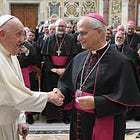
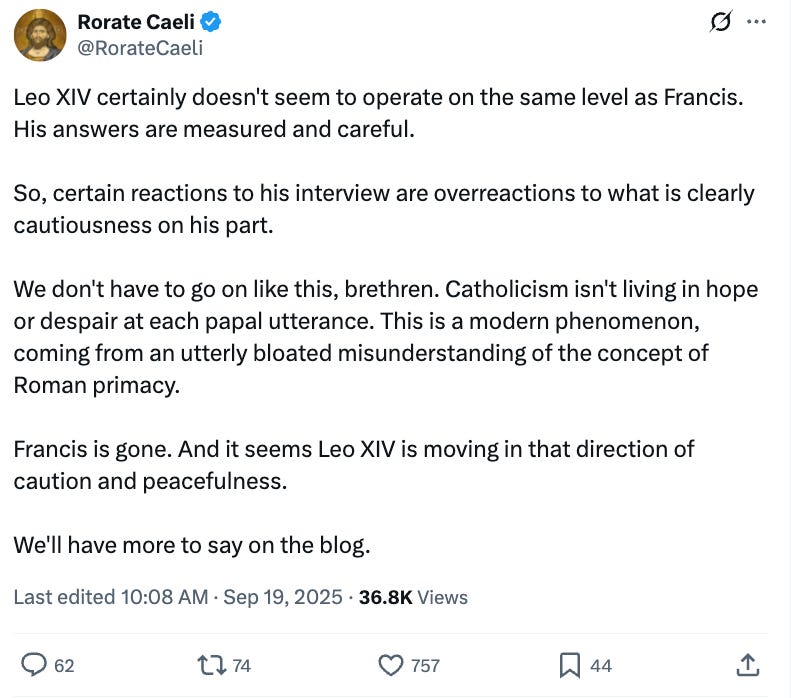
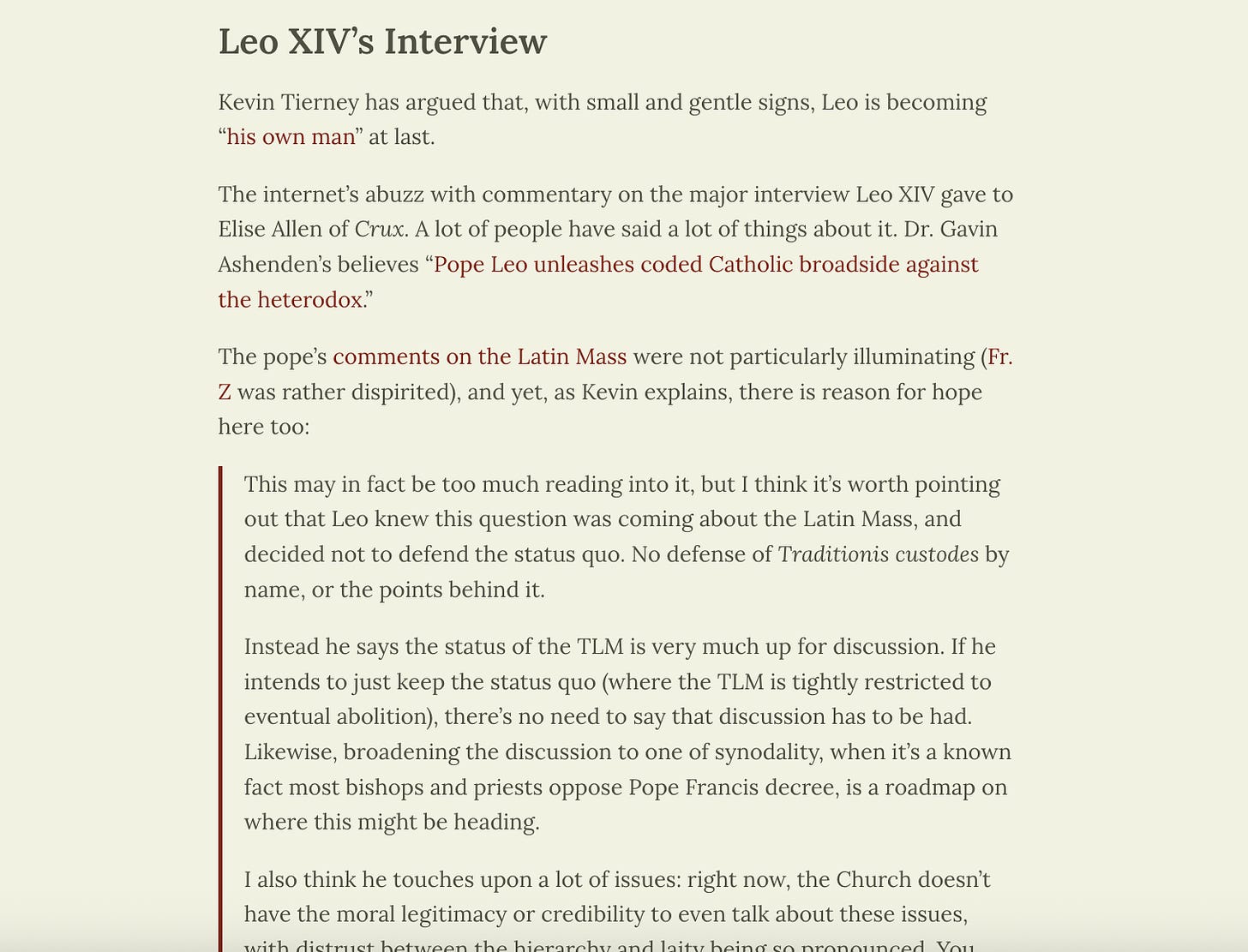
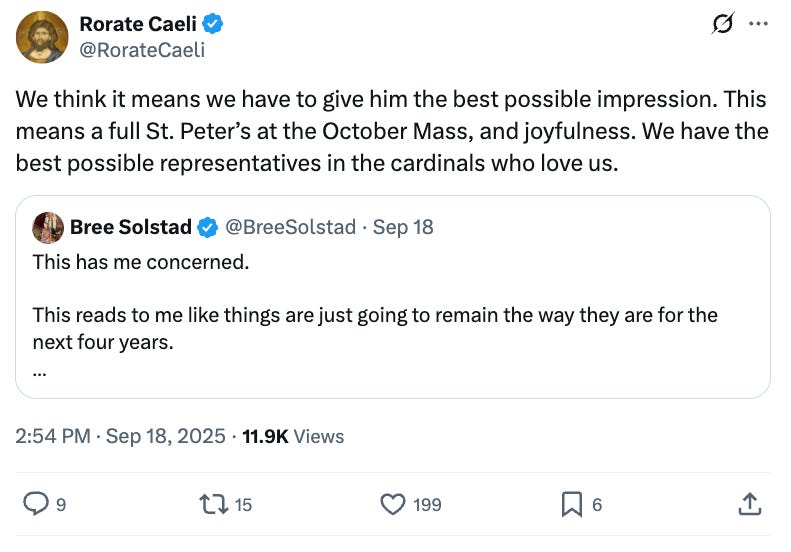
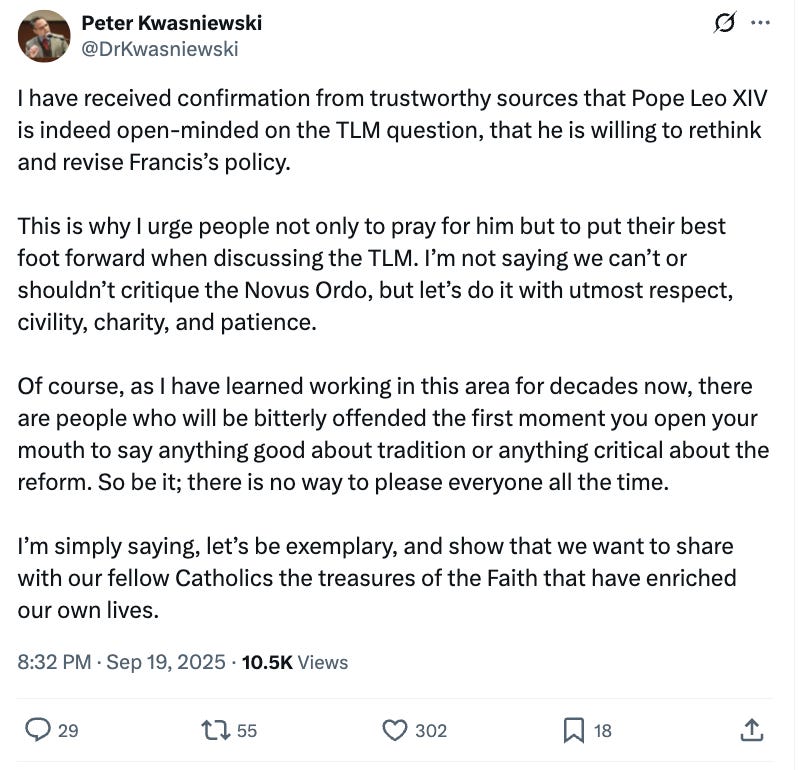
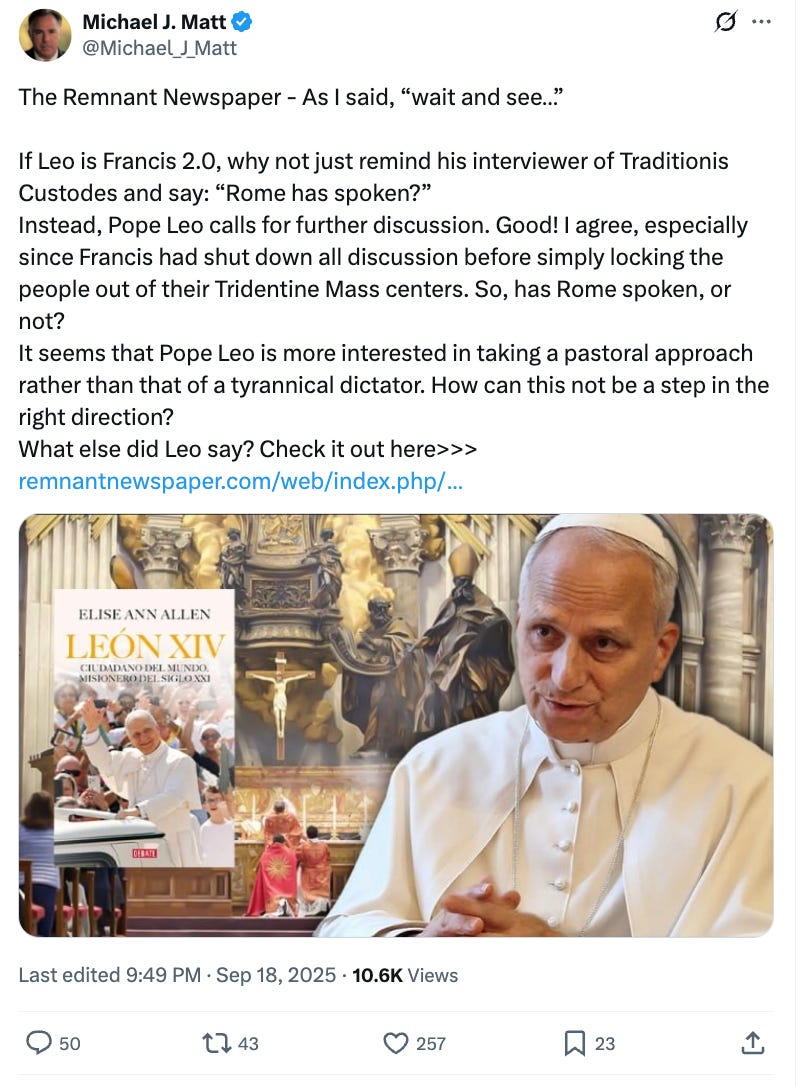
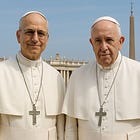

Prevost is not a megalomaniac for wanting to change doctrine, he is a total theological lightweight who has no idea of the gravity of the office he has usurped. When we imagined Big Apostasy, we thought of intentionally evil men, not bland bureaucrats. Perhaps this is most evil of all: a man who should be shepherd of souls is a mere HR officer.
If the Novus Ordo priests and hierarchy think it's OK to ignore St Pius V and the Papal Bull at the Council of Trent, and do not fear anathema, I'm not worrying about ignoring them.
I used to have to drive 3 hours to a TLM, and only went twice a month. Now, I have one about an hour away so I can go every week. There is no way I'm going to attend a mass where sacrilege in handling the Host is taking place, or the other modernist nonsense.
To me, it's not the Church. They have gutted the actual Catholic Church and are wearing it like a skin suit. Wolves in sheep's clothing, indeed.